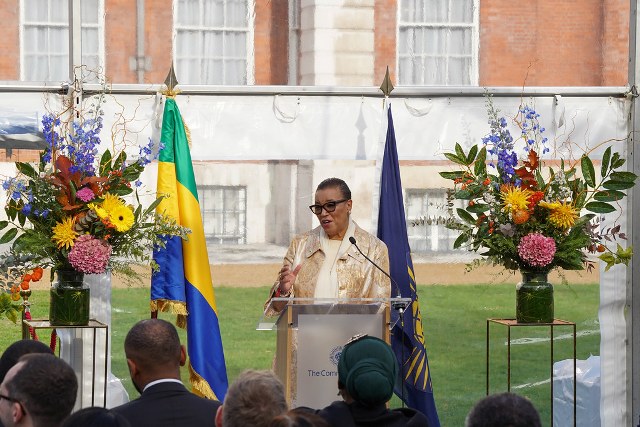 Commonwealth Secretary General Patricia Scotland addresses the Gabon flag raising ceremony at the Secretariat in October. [photo: Commonwealth Flikr site]
Commonwealth Secretary General Patricia Scotland addresses the Gabon flag raising ceremony at the Secretariat in October. [photo: Commonwealth Flikr site]
[This is an excerpt from an article in The Round Table: The Commonwealth Journal of International Affairs. Views expressed do not represent the opinion of the editorial board.]
On 24 June 2022 at the Commonwealth Heads of Government Meeting in Kigali, two new members joined the organisation. Like host country Rwanda, neither had colonial ties with the United Kingdom. Both have been ruled by France – even after independence in 1960 – enmeshed within an infamous neo-colonial network, Françafrique. One consequence of this relationship is that French, and not English, is both the official language and the lingua franca for their diverse ethnolinguistic populations. The Gabonese continue to speak 40 African languages (notably Fang, Mbete, Myene, and Nzebi) and the Togolese speak 44 (two of which, Ewé and Kabiyé, are official languages) alongside French, which remains hegemonic, being taught in schools, used in government, wielded in law, essentially the language of power.
Because it is in West Africa, the English language is increasingly apparent in Togo outside of public instruction. It is extensively taught at most private institutions of business and law. Additionally, the main banks in Togo are international, where English is used in exchanging US dollars. Many financial institutions make trades in English due to Western funding. Togolese youth also know English lyrics from popular music. The majority of the Ewe tribe is split between Ghana and Togo; therefore, a small minority speak English. But in Gabon, despite English being introduced during the colonial era by missionaries, it has made less headway (apart from education for the deaf using American Sign Language, introduced by the deaf American missionary Andrew Foster). As the language of international business, Gabonese elites who do business with America, India or China, can speak it. Yet despite promises to make it an official language, following the lead of Rwanda, few ordinary Gabonese can speak Anglais.
So why have these countries joined an organisation based on a shared history and language when they share neither?
First is trade. Boris Johnson’s ‘New Partnership’ proposal resulted in two African Investment Summits in London. Johnson said in his opening statement, ‘It is my ambition for the UK to be Africa’s investment partner of choice’. He promised to mobilise £4 billion in public aid, and £6.6 billion in private investment. Both Gabon and Togo have been looking to diversify their commercial partnerships. The Commonwealth offers them a splendid promise of prosperity through trade.
Second is influence. The Commonwealth offers an additional means of lobbying major donors and diplomatic players like the UK, India, and Canada. Presidents Faure Gnassingbe of Togo and Ali Bongo of Gabon have conducted foreign policy as personal, presidential matters, travelling to international fora with their entourages, aggrandising themselves and thereby highlighting their personal indispensability to any future agreements. Multilateral fora are also particularly attractive to rulers from small countries who otherwise might get bullied in bilateral negotiations by bigger, richer, more powerful states.
Third is culpability. With a population of about eight million, Togo was ruled for 38 years by strongman Gnassingbe Eyadema and now by his son, Faure Gnassingbe. With a population of about two million, Gabon was ruled for 42 years by the late president-for-life Omar Bongo, and now by his son, Ali Bongo. Both authoritarian dynasties have maintained close ties with Paris for decades, but like other Francophone regimes they now seek to be less reliant on their former ruler, and less liable, following embarrassing criminal investigations by French judges into their vast offshore trusts and other illegal enrichment.
The state of democracy and human rights in these countries leaves much to be desired. Both were one party authoritarian regimes during the Cold War and, after the fall of the Berlin Wall, were pressured by Western donors to introduce democratic reforms with multiparty elections. Instead they superficially added plebiscites to re-elect their aged rulers and their kleptocratic ‘selectorates’.
Douglas Yates is an Associate Professor at the American Graduate School in Paris.



